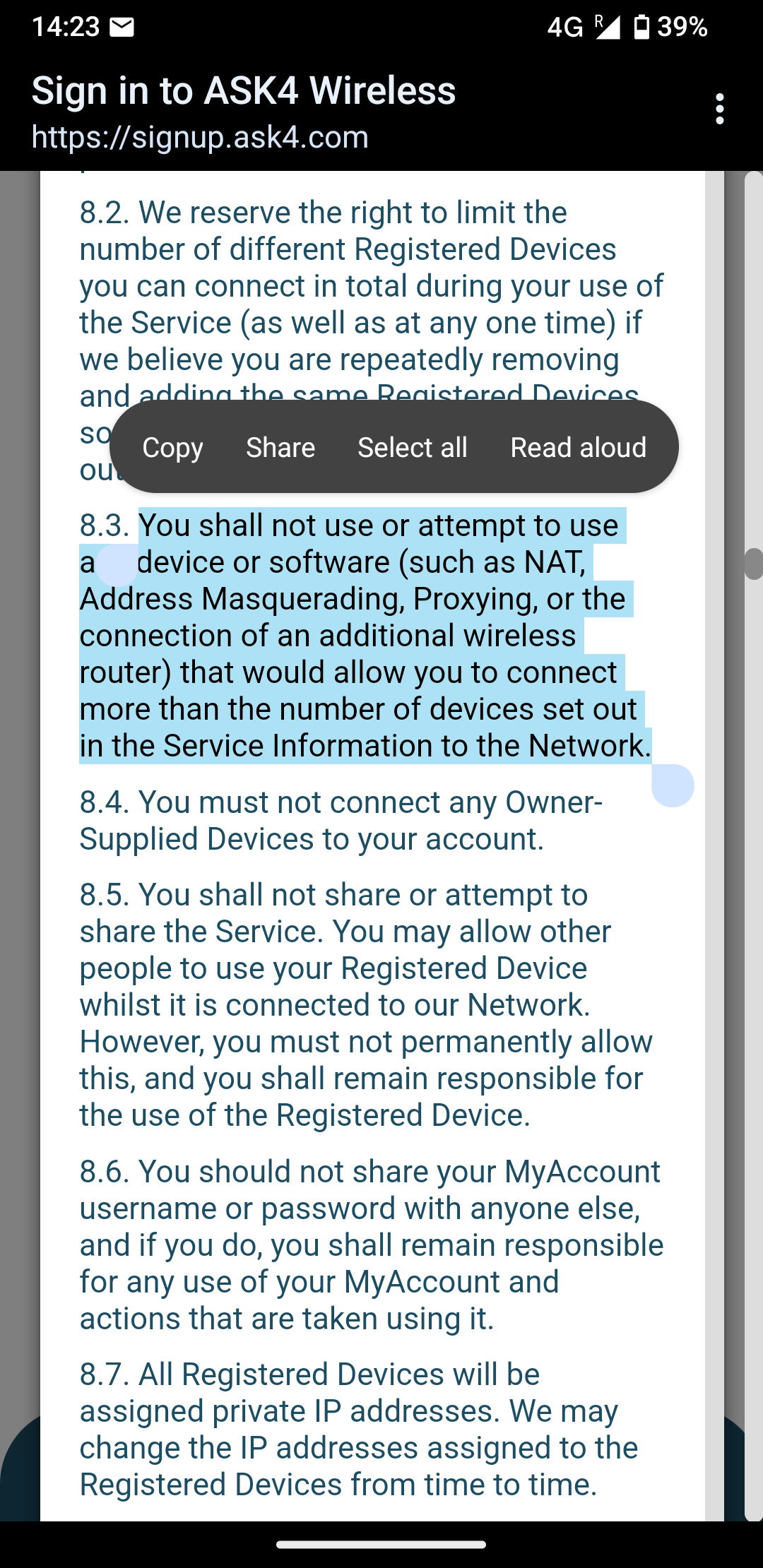this post was submitted on 07 Sep 2024
472 points (92.6% liked)
Technology
59963 readers
3495 users here now
This is a most excellent place for technology news and articles.
Our Rules
- Follow the lemmy.world rules.
- Only tech related content.
- Be excellent to each another!
- Mod approved content bots can post up to 10 articles per day.
- Threads asking for personal tech support may be deleted.
- Politics threads may be removed.
- No memes allowed as posts, OK to post as comments.
- Only approved bots from the list below, to ask if your bot can be added please contact us.
- Check for duplicates before posting, duplicates may be removed
Approved Bots
founded 2 years ago
MODERATORS
you are viewing a single comment's thread
view the rest of the comments
view the rest of the comments

I'm with you, but how is using your own router messing that up?
On the WAN side, its just a dhcp client, just like any other laptop/xbox etc
It's not reasonable for a ISP to dictate what CPE can be used on the network, as long as the CPE does not break the network, and routers are fairly well behaved clients by design.
Just from a data hygiene and security perspective, you don't want to put your own computer directly into a bigger network, safter to be behind your own router.
Rf interference. Similar to having multiple microwaves running near your router, or those old rf based baby monitors.
Congested the 2.4 or 5gz spectrum with noise causing noise and retransmits or outright stopping the wifi from working.
If you have an old radio that does AM find a AM channel that isn’t broadcasting and bring it near your router. You can actually “hear” the noise those things are putting out.
Happily the 2.4Ghz and 5Ghz bands are unlicensed and open for public use.
Nothing our OP said indicated they wanted to run WiFi, but even if they did, they could choose a less noisy channel.
Nothing in the click through agreement talked about radios, or bands.
Any body could turn their phone into a cellular hotspot, or have a starlink hotspot, and that is nobody elses business. This is no different.
Letting the network dictate what you can run in your own home is MaBell levels of authoritarianism, but more to the point, its unenforceable ( You can always take a page out of how to hotspot book - Router runs a always on vpn and the lan side only goes out over the VPN, so DPI just seeds the router, and the TTL is as expected)
But this is a dorm. A shared environment with close proximity.
If everyone had their own Wi-Fi transmitting at normal power there would be too much interference that even channel hopping wouldn’t fix it.
Not to say that there can’t be some middle ground but the Wild West attitude isn’t kosher either.
OP already mentioned that the student WiFi is being run entirely by a third party ISP and they have more expensive paid plans for more than one device.
Guaranteed this isn't about running an optimal network (Though I'm sure if pressed about it they'll start spouting excuses similar to yours) and all about company greed and constant profit growth.
Probably. But I didn’t want them dealing with being cut off. They can do what they want but since it’s a dorm you can be sure they’ve had these conversations before
Yeah I definitely don't want to hurt the network for other folks staying at this (very large) dorm complex/building. Can I reasonably run it at low power (since I only need it in my room) and not have it bother anyone?
Yes, this is one of those things that as long as you do it properly and don't interfere with anything nothing will happen
Reduce power to minimal levels, choose a band far away from the WiFi in your area (There are a number of WiFi scanning apps on the app stores) and ensure you plug in the Ethernet from the wall into the WAN port on the router so your router can handle DHCP without interfering with University DHCP networking (though it might make getting through the captive portal tricky)
Do a frequency scan, choose a 5ghz band, narrowest band you can, that isn't being used, (don't use 2.4ghz, 5ghz attenuates the fastest). If your router supports DFS, use a DFS channel
Depends on whether you can adjust the Tx level but then you run into FCC level stuff that most people avoid (since boosting it is a huge issue with interference)
I'm in the UK, not sure if they have their own british version of the FCC or just follow their rules but it might be different. The router/AP is a tp link Archer C6, which I use as it is performant enough to do VR streaming w/o stutters or high latency.
This is for the A7 but may show you how to turn off wifi on yours if the UI is the same
https://community.tp-link.com/us/home/forum/topic/560824
Thanks. I do unfortunately need wifi to do wireless VR streaming... I guess I need to find a way to tune it to interfere the least, but this is a whole alien world to me.
Looks like that model allows you to go down to 50% (Options are Low/50, medium/75 and full)
But looks like your router might be supported by openwrt, if you can get that working you can set the power as low as you want
https://openwrt.org/toh/tp-link/archer_c6_v2
ok.... so our friendly OP can use their router without turning on the radios and everyone is happy? let's advise that then